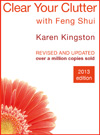We can’t take any of our material possessions with us when we die, so why is it that some people get so attached to their belongings while they are alive?

I once did a clutter clearing consultation with a woman who agonized for hours over letting go of six boxes of handicraft materials she had hauled from home to home for two decades or more and never used.
By contrast, another client I worked with had so little attachment to the things in her apartment that when asked what she would rescue in the event of a fire, she couldn’t think of anything she would want to save. Her possessions were nice, but to her they were only things and they didn’t have much importance.
So what is it that makes some people want to hold on to things and other people not to care about them at all?
History abounds with tales of spiritual seekers who renounced all worldly possessions in their quest to find enlightenment. But after much self-deprivation himself, even the Buddha discovered that “The Middle Way” was a more wholesome approach – having enough to satisfy one’s needs but not so much as to be self-indulgent.
My own take on this is quite similar. I have observed that people fall out of integrity if they fail to provide for themselves the means to do the things they truly want to do, and they also fall out of integrity if they become so attached to material possessions that it causes them to lose touch with the spiritual dimension of their life. It’s all about finding the right balance – enough to do what you are here to do and not so much that it holds you back.
The inescapable fact of life is that no one can take any of their things with them when they die. We are born with nothing and we die with nothing. The things we acquire while we’re alive can help or hinder us in our journey but, in the end, they are all stripped away. Over-attachment to material things is ultimately futile.
Getting the right balance
Life in our modern world works best if we have around us the things we need in our daily lives, and it’s also fine to have a few treasured possessions that bring joy to our hearts. It’s only over-attachment to material things that causes imbalance, and even then the cause is not the things themselves. The most common reason for holding onto things in this way is that it’s an attempt to compensate for an emotional or spiritual loss of some kind. If you work through the feelings of loss, the physical objects will no longer be needed.
In my experience, any method of helping people do clutter clearing that does not address this deeper level of sourcing means it will only be a matter of time before new clutter appears to replace the old. That’s why I put such emphasis on this aspect in my books, articles and online courses.
Copyright © Clear Space Living Ltd 2022
Related articles
When someone dies, do you really need to keep things to remember them by?
What’s missing from minimalism
Resource
Fast-Track Clutter Clearing online course
Like to read more articles like this?
Subscribe to my newsletters to receive news, articles and information about upcoming online courses by email. And I promise you – no junk mail ever.



